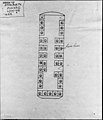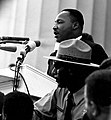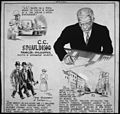The civil rights movement portal The civil rights movement was a social movement and campaign from 1954 to 1968 in the United States to abolish legalized racial segregation, discrimination, and disenfranchisement in the country. The movement had its origins in the Reconstruction era during the late 19th century and had its modern roots in the 1940s, although the movement made its largest legislative gains in the 1960s after years of direct actions and grassroots protests. The social movement's major nonviolent resistance and civil disobedience campaigns eventually secured new protections in federal law for the civil rights of all Americans. After the American Civil War and the subsequent abolition of slavery in the 1860s, the Reconstruction Amendments to the United States Constitution granted emancipation and constitutional rights of citizenship to all African Americans, most of whom had recently been enslaved. For a short period of time, African-American men voted and held political office, but as time went on Blacks were increasingly deprived of civil rights, often under the racist Jim Crow laws, and African Americans were subjected to discrimination and sustained violence by white supremacists in the South. Over the following century, various efforts were made by African Americans to secure their legal and civil rights, such as the civil rights movement (1865–1896) and the civil rights movement (1896–1954). The movement was characterized by nonviolent mass protests and civil disobedience following highly publicized events such as the lynching of Emmett Till. These included boycotts such as the Montgomery bus boycott, "sit-ins" in Greensboro and Nashville, a series of protests during the Birmingham campaign, and a march from Selma to Montgomery. At the culmination of a legal strategy pursued by African Americans, in 1954 the Supreme Court struck down the underpinnings of laws that had allowed racial segregation and discrimination to be legal in the United States as unconstitutional. The Warren Court made a series of landmark rulings against racist discrimination, including the separate but equal doctrine, such as Brown v. Board of Education (1954), Heart of Atlanta Motel, Inc. v. United States (1964), and Loving v. Virginia (1967) which banned segregation in public schools and public accommodations, and struck down all state laws banning interracial marriage. The rulings played a crucial role in bringing an end to the segregationist Jim Crow laws prevalent in the Southern states. In the 1960s, moderates in the movement worked with the United States Congress to achieve the passage of several significant pieces of federal legislation that authorized oversight and enforcement of civil rights laws. The Civil Rights Act of 1964 explicitly banned all discrimination based on race, including racial segregation in schools, businesses, and in public accommodations. The Voting Rights Act of 1965 restored and protected voting rights by authorizing federal oversight of registration and elections in areas with historic under-representation of minority voters. The Fair Housing Act of 1968 banned discrimination in the sale or rental of housing. (Full article...) Selected article -The murders of Chaney, Goodman, and Schwerner, also known as the Freedom Summer murders, the Mississippi civil rights workers' murders, or the Mississippi Burning murders, were the abduction and murder of three activists in Philadelphia, Mississippi, in June 1964, during the Civil Rights Movement. The victims were James Chaney from Meridian, Mississippi, and Andrew Goodman and Michael Schwerner from New York City. All three were associated with the Council of Federated Organizations (COFO) and its member organization, the Congress of Racial Equality (CORE). They had been working with the Freedom Summer campaign by attempting to register African Americans in Mississippi to vote. Since 1890 and through the turn of the century, Southern states had systematically disenfranchised most black voters by discrimination in voter registration and voting. Chaney was African American, and Goodman and Schwerner were both Jewish. The three men had traveled roughly 38 miles (61 km) north from Meridian, to the community of Longdale, to talk with congregation members at a black church that had been burned; the church had been a center of community organization. The trio was arrested following a traffic stop for speeding, escorted to the local jail, and held for a number of hours. As the three left town in their car, they were followed by law enforcement and others. Before leaving Neshoba County, their car was pulled over again. The three were abducted, driven to another location, and shot at close range. The bodies were buried in an earthen dam. The disappearance of the three men was initially investigated as a missing persons case. The civil-rights workers' burnt-out car was found parked near a swamp three days after their disappearance. An extensive search of the area was conducted by the Federal Bureau of Investigation (FBI), local and state authorities, and 400 U.S. Navy sailors. Their bodies were not discovered until seven weeks later, when the team received a tip. During the investigation it emerged that members of the local White Knights of the Ku Klux Klan, the Neshoba County Sheriff's Office, and the Philadelphia, Mississippi Police Department were involved in the incident. (Full article...)General imagesThe following are images from various civil rights movement-related articles on Wikipedia.
Related portalsWikiProjectsSelected biography -
Joseph Sidney Gelders (November 20, 1898 – March 1, 1950) was an American physicist who later became an antiracist, civil rights activist, labor organizer, and communist. In the mid-1930s, he served as the secretary and southern-U.S. representative of the National Committee for the Defense of Political Prisoners. In September 1936, Gelders was kidnapped, beaten, and nearly killed by members of the Ku Klux Klan for his civil rights and labor organizing activities. After his recovery, Gelders continued his activism and cofounded the Southern Conference for Human Welfare and the National Committee to Abolish the Poll Tax. He collaborated closely with other activists including Lucy Randolph Mason and Virginia Foster Durr. Internal injuries sustained during his kidnapping and assault led to Gelders' death on March 1, 1950. (Full article...)
Selected image - A. Philip Randolph and other civil rights leaders on their way to Congress during the March on Washington, 1963.
Did you know?
TopicsSubcategoriesThings to doAssociated WikimediaThe following Wikimedia Foundation sister projects provide more on this subject:
Discover Wikipedia using portals
|






















































